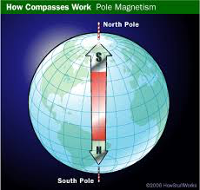|
Why Is It That a Compass Points North? A compass points north because the Earth is telling it to. 
The thing that drives a compass is the magnet inside, suspended in a liquid that allows it to spin freely. The magnet aligns itself with Earth's magnetic field, specifically the South Magnetic Pole, and points in the opposite direction, North. This illustrates the most basic concept of magnetism, that the positive end of a magnet is attracted to the negative end of another magnet, and vice versa. (Opposites attract.) A compass is a good thing to have when you need to know where North is, as a starting point. GPS is usually available, but many outdoor areas do not have coverage sufficient to triangulate and form a signal, so a GPS device (such as a smartphone) might not always be the answer. A compass works underwater because the magnet isn't affected by water. A compass works in space, at least as far away from Earth as the magnetic field lasts, because the magnet inside the compass needs only to find a magnetic field. The Sun and some other heavenly bodies have magnetic fields, so a compass might well be able to take advantage of those magnetic fields as well. The other thing to note is that the compass will point the way to the Magnetic North Pole, but this is not technically "true north," or the Geographic North Pole. In truth, the Magnetic North Pole is several hundred miles south of the Geographic North Pole and moving a bit farther away every year. That shouldn't matter if you only to find North, however. Besides, if you really need to know the difference, you will have brought your declination charts and other technical equipment that serious compass-wielders stock. One thing to note from history: The Chinese invented the compass. In times past, the Chinese compass pointed to the South Pole. Why? Because they wanted it to; it's the same reason that most compasses point North–because we want them to do so. Have a suggestion for this feature? Email Dave. |
Social Studies for Kids |





